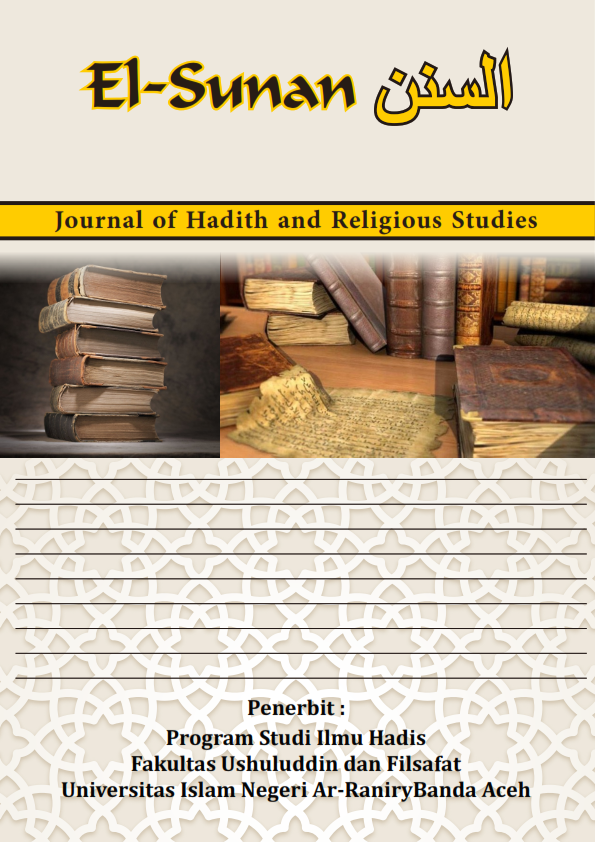Islamic Tolerance in Theory and Practice: Insights from Hadiths and Contemporary Relevance
DOI:
https://doi.org/10.22373/el-sunan.v2i2.5989Keywords:
Tolerance, Islam, Hadith, Universal Brotherhood, Mu’amalahAbstract
Tolerance is a fundamental principle in Islam that fosters social harmony within diverse societies. This study examines the concept of tolerance in Islam by focusing on the traditions (hadiths) of Prophet Muhammad (peace be upon him) and its implementation in social life. Employing a thematic (maudhū’i) approach, the research explores various dimensions of tolerance, including universal brotherhood, tolerance in mu’amalah (socio-economic interactions), respect for religious differences, and self-tolerance. The findings reveal that tolerance in Islam is not merely about accepting diversity but also reflects principles of compassion, justice, and moderation within the framework of Islamic law (sharia). Prophet Muhammad serves as a primary model in practicing tolerance, evident in his interactions and policies that upheld the rights of individuals and groups, including non-Muslims. This study underscores the relevance of Islamic tolerance in addressing the challenges of contemporary multicultural societies, offering a foundation for building harmonious relationships amidst diversity.
References
Ginting, Rosalina, and Kiki Ayaningrum, ‘Toleransi Dalam Masyarakat Plural’, Jurnal Ilmiah Majalah Lontar, 23.4 (2009), pp. 1–7, doi:10.26877/LTR.V23I4.665
Hertina, ‘Toleransi Upaya Untuk Mewujudkan Kerukunan Umat Beragama’, TOLERANSI: Media Ilmiah Komunikasi Umat Beragama, 2009, 207–17, doi:10.24014/TRS.V1I2.452
Ibnu Hajar al-Asqalani, Fath Al-Bari Syarh Sahih Al-Bukhari (Maktabah Fahd al-Wataniyah, 2001)
‘Jami` At-Tirmidhi 1924 - Chapters on Righteousness And Maintaining Good Relations With Relatives - كتاب البر والصلة عن رسول الله صلى الله عليه وسلم - Sunnah.Com - Sayings and Teachings of Prophet Muhammad (صلى الله عليه و سلم)’ <https://sunnah.com/tirmidhi:1924>
Kementrian Agama RI, ‘Islam, Pluralisme, Dan Multikulturalisme’, 2022 <https://kemenag.go.id/moderasi-beragama/islam-pluralisme-dan-multikulturalismenbsp-oqfeej>
Klaina, Mekki, and Ansusa Putra, ‘AL-TASĀMUH OR TOLERANCE IN THE QURAN AND SUNNAH? And Claims of The Deniers’, Living Islam: Journal of Islamic Discourses, 7.1 (2024), doi:10.14421/lijid.v7i1.5367
Kurniawan, Alhafiz, ‘Piagam Madinah Dan Semangat Kebangsaan Nabi Muhammad’, 2021 <https://islam.nu.or.id/sirah-nabawiyah/piagam-madinah-dan-semangat-kebangsaan-nabi-muhammad-IF4yR>
Meriana, ‘Tasamuh Adalah Sikap Toleransi, Ini Dalil Hadits Dan Contoh Tasamuh -’, Muslim Terkini, 2022 <https://www.muslimterkini.id/khazanah/pr-904248886/tasamuh-adalah-sikap-toleransi-ini-dalil-hadits-dan-contoh-tasamuh>
Munawwir, A. Warson, Kamus Al-Munawwir, Arab-Indonesia Terlengkap, Edisi Kedu (Pustaka Progressif, 1997)
Mursyid, Salma, ‘Konsep Toleransi (Al-Samahah) Antar Umat Beragama Perspektif Islam’, Aqlam: Journal of Islam and Plurality, 1.2 (2016), doi:10.30984/ajip.v1i2.504
‘Sahih Al-Bukhari 1312, 1313 - Funerals (Al-Janaa’iz) - كتاب الجنائز - Sunnah.Com - Sayings and Teachings of Prophet Muhammad (صلى الله عليه و سلم)’ <https://sunnah.com/bukhari:1312>
‘Sahih Al-Bukhari 2331 - Agriculture - كتاب المزارعة - Sunnah.Com - Sayings and Teachings of Prophet Muhammad (صلى الله عليه و سلم)’ <https://sunnah.com/bukhari:2331> [accessed 9 November 2024]
‘Sahih Al-Bukhari 2386 - Loans, Payment of Loans, Freezing of Property, Bankruptcy - كتاب فى الاستقراض - Sunnah.Com - Sayings and Teachings of Prophet Muhammad (صلى الله عليه و سلم)’ <https://sunnah.com/bukhari:2386> [accessed 9 November 2024]
‘Sahih Al-Bukhari 2942 - Fighting for the Cause of Allah (Jihaad) - كتاب الجهاد والسير - Sunnah.Com - Sayings and Teachings of Prophet Muhammad (صلى الله عليه و سلم)’ <https://sunnah.com/bukhari:2942> [accessed 9 November 2024]
‘Sahih Al-Bukhari 3166 - Jizyah and Mawaada’ah - كتاب الجزية والموادعة - Sunnah.Com - Sayings and Teachings of Prophet Muhammad (صلى الله عليه و سلم)’ <https://sunnah.com/bukhari:3166> [accessed 9 November 2024]
‘Sahih Al-Bukhari 39 - Belief - كتاب الإيمان - Sunnah.Com - Sayings and Teachings of Prophet Muhammad (صلى الله عليه و سلم)’ <https://sunnah.com/bukhari:39> [accessed 9 November 2024]
‘Sahih Al-Bukhari 43 - Belief - كتاب الإيمان - Sunnah.Com - Sayings and Teachings of Prophet Muhammad (صلى الله عليه و سلم)’ <https://sunnah.com/bukhari:43> [accessed 9 November 2024]
‘Sahih Al-Bukhari 6397 - Invocations - كتاب الدعوات - Sunnah.Com - Sayings and Teachings of Prophet Muhammad (صلى الله عليه و سلم)’ <https://sunnah.com/bukhari:6397> [accessed 9 November 2024]
Shomad, Bukhori Abdul, Farhat Abdullah, Yosep Aspat Alamsyah, Erwin Muslimin, Siti Julaeha, and Andewi Suhartini, ‘Piagam Madinah Dan Resolusi Konflik’, Al-Adyan: Jurnal Studi Lintas Agama, 2.2 (2013), pp. 120–41, doi:https://doi.org/10.24042/ajsla.v8i2.586
Suryan, Suryan, ‘TOLERANSI ANTARUMAT BERAGAMA: PERSPEKTIF ISLAM’, Jurnal Ushuluddin, 23.2 (2017), p. 185, doi:10.24014/jush.v23i2.1201
Ula, Ahmad Nilnal Munachifdlil, and Hanik Hidayati, ‘Harmoni Sosial Dalam Perspektif Islam: Tinjauan Terhadap Masyarakat Kontemporer’, Jurnal Keislaman, 7.1 (2024), pp. 170–82, doi:10.54298/jk.v7i1.252
Downloads
Published
How to Cite
Issue
Section
License
Copyright (c) 2024 Muhammad Zaini

This work is licensed under a Creative Commons Attribution-NonCommercial-ShareAlike 4.0 International License.
- Authors retain copyright and grant the journal right of first publication with the work simultaneously licensed under an Attribution-NonCommercial-ShareAlike 4.0 International (CC BY-NC-SA 4.0) that allows others to share the work with an acknowledgment of the work's authorship and initial publication in this journal.
- Authors are able to enter into separate, additional contractual arrangements for the non-exclusive distribution of the journal's published version of the work (e.g., post it to an institutional repository or publish it in a book), with an acknowledgment of its initial publication in this journal.
- Authors are permitted and encouraged to post their work online (e.g., in institutional repositories or on their website) prior to and during the submission process, as it can lead to productive exchanges, as well as earlier and greater citation of published work.










